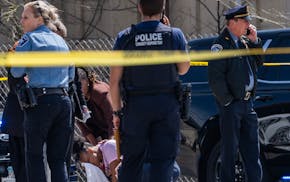Opinion editor's note: Strib Voices publishes a mix of commentary online and in print each day. To contribute, click here.
•••
A National Geographic editor called me less than a week after George Floyd was murdered in May 2020 to pitch a story idea. My friend, a former newspaper colleague, got straight to the point: Would I write an essay about what had just happened in Minneapolis?
"What does this moment in worldwide protest history mean?" she asked.
I lived in Cleveland at the time. Like most of the planet, I was hunkered down, adjusting to the confusing start of pandemic life. I sorely missed the freedom of uninterrupted mobility and public association.
Then Darnella Frazier's cellphone video of Derek Chauvin's knee planted on George Floyd's neck exploded into our collective consciousness. Floyd's brutal demise instantly felt personal to me.
As mass Floyd demonstrations grew by the day — some peaceful, others not — it became clear to many that we were witnessing a social justice reckoning unlike any our nation (perhaps the world) had confronted in decades. That's what I wrote for National Geographic.
While I have and always will defend faithful and courageous law enforcement (and I have friends in law enforcement who saw the encounter differently than I did), I editorialized that we all bore witness to a public lynching. I called the murder an "Emmett Till" moment, from which a nation must muster courage and capacity to learn, or continue to burn.
That was my take then. My thoughts have continued to evolve; my memories are now informed and, perhaps, tempered by hindsight. I'm sure I'm not alone. Five years later, I now live in Minnesota, having become the opinion editor of the Minnesota Star Tribune in July 2024. It still feels slightly surreal. Rarely a week goes by that I don't leave my residence in the northeast part of Minneapolis and visit George Floyd Square. The visits help keep me centered in what I consider an important space and the epicenter of the reckoning — if not a lurching and still nascent community movement.
Minnesota's largest city sometimes appears to have taken measurable steps beyond the tragedy and compounded economic disaster. Then, sometimes, it doesn't. In some places, it remains hauntingly frozen.
Where have we actually landed? Have we lost initial vital agency, momentum and the aspiration to form a united community? Is the drive for the advancement of important social construction still in play in Minneapolis and beyond?
I have more questions than answers. That's why I would love to hear your thoughts and ideas. I'd like to invite you to participate in a potentially useful conversation as many prepare to reflect on the meaning of Floyd's life and death. Is it also possible to expand on that conversation?
In an era in which many of us are increasingly fearful to publicly offer candid observations or speak their truths, how can we find ways to continue to address issues that affect a rapidly changing world? It was a jolting reality check to hear the admission of U.S. Sen. Lisa Murkowski of Alaska, last week that she has grown "anxious" to raise her voice to offer critiques of the current state of affairs. That our most powerful public leaders have grown increasingly reticent is telling. But the only way forward is the continuation of tough and difficult conversation.
I'm asking that you join me for a soul-searching conversation about Minnesota as we prepare to mark five years since the murder. My colleagues and I are soliciting written responses from Minnesotans statewide.
We have created a menu of four questions that we would like you to consider to help advance a public conversation. We ask that you choose one for reflection:
- How are your thoughts about the murder and unrest different from your initial reaction in May 2020?
- Was there a specific moment subsequently when you noticed your own thinking or behavior shift because of the national conversation that followed those events?
- What has surprised you most — or least — about how society has responded?
- What meaningful change do you hope will happen in the next five years?
I'm especially interested in the response to the forward-looking question regarding the next five years. If you feel compelled to offer your thoughts, there is no need for throat-clearing or the burden of nuance in your response. Write from the heart. Feel free to limit your response to as little as a single powerful sentence or create a pithy essay of 200 words or fewer.
Here's a submission form where you can find the questions listed above and the space to create a response.
We will begin publishing responses to this reader callout during the weekend leading up to the five-year commemoration of the day George Floyd died on May 25, 2020. The deadline for submissions is May 9. I really look forward to hearing from many of you!
Thanks in advance.
Morris: State workers return, St. Paul stirs — but will it stick?


